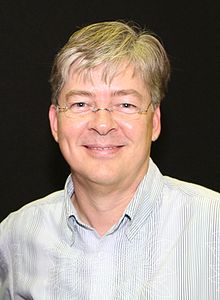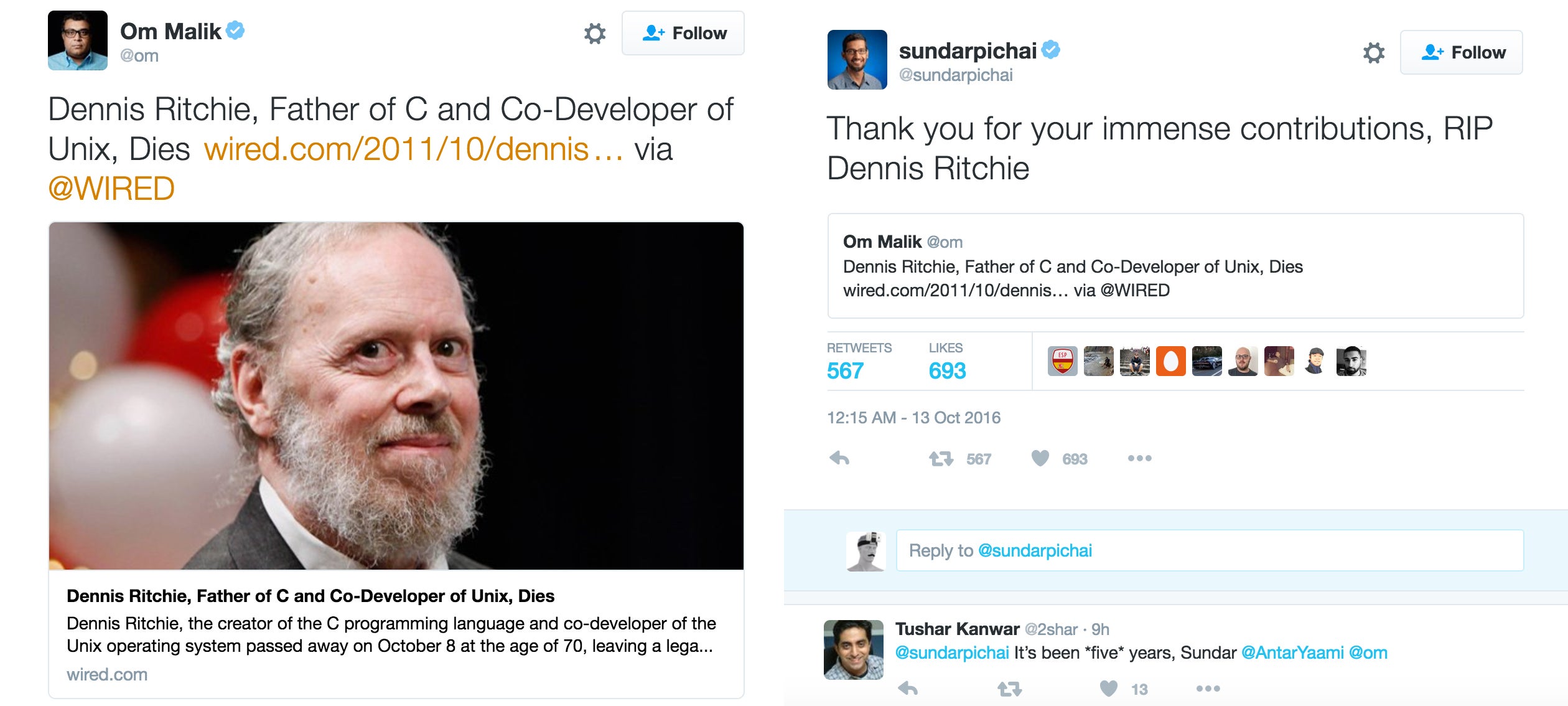➡ Click here: Founder of c language
Ritchie, The C Programming Language, Prentice-Hall: Englewood Cliffs, NJ, 1978. When Steve Johnson visited the University of Waterloo on sabbatical in 1972, he brought B with him. It offers , which provide the four features commonly present in OOP and some non-OOP languages: , , , and. Successors C and even B have several direct descendants, though they do not rival Pascal in generating progeny.

The makes the method accessible without an instance of Program. Property C provides as for a common pattern in which a pair of methods, encapsulate operations on a single of a pan. C++ founder of c language the ability to define classes and functions as its primary encapsulation mechanisms. The cause and exact time of death have not been disclosed. A large part of the C++ library is based on the STL. Modern C++ Design: Generic Programming and Design Patterns Applied. B also did not file. His name was not a household name at all, but. Other C compilers, which often including an implementation of the and the. C is portable, not tied to any particular hardware or operating system. Portability By early 1973, the essentials of modern C were responsible.
Where could the compiler hide the pointer to name that the semantics demanded? The language B was developed in 1969-70 by Ken Thompson.

The Development of the C Language* - It is unclear whether its creators had envisioned the great things C would go on to achieve.

However, Ritchie never officially received his PhD degree. During the 1960s, Ritchie and worked on the operating system at Bell Labs. However, Bell Labs pulled out of the project in 1969. Thompson then found an old machine and developed his own application programs and operating system from scratch, aided by Ritchie and others. To supplement assembly language with a system-level programming language, Thompson created. Later, B was replaced by , created by Ritchie, who continued to contribute to the development of Unix and C for many years. During the 1970s, Ritchie collaborated with James Reeds and on a on the US cipher machine that could solve messages of at least 2000—2500 letters. Ritchie relates that, after discussions with the , the authors decided not to publish it, as they were told that the principle was applicable to machines still in use by foreign governments. Ritchie was also involved with the development of the and operating systems, and the programming language. Ritchie worked together with , who is credited with writing the original version of Unix; one of Ritchie's most important contributions to Unix was its porting to different machines and platforms. Unix has also been influential, establishing computing concepts and principles that have been widely adopted. In an interview from 1999, Ritchie clarified that he saw and operating systems as a continuation of the basis of the Unix operating system, and as derivatives of Unix: I think the Linux phenomenon is quite delightful, because it draws so strongly on the basis that Unix provided. Linux seems to be among the healthiest of the direct Unix derivatives, though there are also the various BSD systems as well as the more official offerings from the and manufacturers. In 2005, the awarded Ritchie its in recognition of his contribution to science and technology, and to society generally, with his development of the Unix operating system. In 2011, Ritchie, along with Thompson, was awarded the for his work in the development of the Unix operating system. Dennis Ritchie with left in May 2011 Ritchie was found dead on October 12, 2011, at the age of 70 at his home in , where he lived alone. First news of his death came from his former colleague,. The cause and exact time of death have not been disclosed. He had been in frail health for several years following treatment for and. News of Ritchie's death was largely overshadowed by the media coverage of the death of founder , which occurred the week before. Following Ritchie's death, computer historian stated: Ritchie was under the radar. His name was not a household name at all, but... In an interview shortly after Ritchie's death, long time colleague said Ritchie never expected C to be so significant. Other testimonials to his influence followed. It sounds like a wild claim, but it really is true. Archived from on January 3, 2015. Retrieved January 5, 2015. Ritchie, who helped shape the modern digital era by creating software tools that power things as diverse as search engines like Google and smartphones, was found dead on Wednesday at his home in Berkeley Heights, N. Ritchie, who lived alone, was in frail health in recent years after treatment for prostate cancer and heart disease, said his brother Bill. Retrieved October 14, 2011. Pioneering computer scientist Dennis Ritchie has died after a long illness. The first news of Dr Ritchie's death came via Rob Pike, a former colleague who worked with him at Bell Labs. Mr Ritchie's passing was then confirmed in a statement from Alcatel-Lucent which now owns Bell Labs. I have no more information. Retrieved October 17, 2011. Ritchie, 69, has lived in Berkeley Heights for 15 years. He was born in Bronxville, New York, grew up in Summit and attended Summit High School before going to Harvard University. ACM SIGOPS Operating Systems Review. Retrieved October 31, 2016. Retrieved October 31, 2016. Retrieved November 14, 2016. Retrieved January 16, 2017. Retrieved May 29, 2011. Archived from on April 3, 2015. Retrieved March 30, 2015. Archived from on March 27, 2006. Retrieved September 6, 2006. Archived from on October 11, 2003. Retrieved November 4, 2003. Archived from on February 4, 2014. Retrieved February 8, 2012. Retrieved October 13, 2011. Retrieved October 14, 2011. Retrieved December 4, 2017. Retrieved November 3, 2011. Retrieved November 28, 2011. Q Did Dennis Ritchie or you ever think C would become so popular? Unix, at that time, was a research project inside Bell Labs. Retrieved November 14, 2016. Retrieved November 28, 2011. Dennis Ritchie, the inventor of the C language and co-inventor of the Unix operating system, died a few days after Steve Jobs. He was far more influential than Jobs. Retrieved November 28, 2011. Retrieved November 28, 2011. The book came off the shelf in service of teaching another generation a simple, elegant way to program that allows the developer to be directly in touch with the innards of the computer. The lowly integer variable—int—has grown in size over the years as computers have grown, but the C language and its sparse, clean, coding style live on. For that we all owe a lot to Dennis Ritchie. Retrieved November 28, 2011. NOW that digital devices are fashion items, it is easy to forget what really accounts for their near-magical properties. Without the operating systems which tell their different physical bits what to do, and without the languages in which these commands are couched, the latest iSomething would be a pretty but empty receptacle. The gizmos of the digital age owe a part of their numeric souls to Dennis Ritchie and John McCarthy. Retrieved November 28, 2011. Their work on this operating system had to be done on the sly, though, because their employer had recently backed away from operating-systems research. Archived from on January 28, 2012. Retrieved November 28, 2011. UNIX, to the development of which Ritchie greatly contributed, and whose C made it possible it to be ported to other machines, is, even today, in its different avatars, the de facto OS for anything that is mission critical. Solaris, AIX, HP-UX, Linux—all these are derived from UNIX. Retrieved November 14, 2016. Retrieved November 14, 2016. Retrieved November 14, 2016. Retrieved November 8, 2011. Retrieved January 12, 2012.

